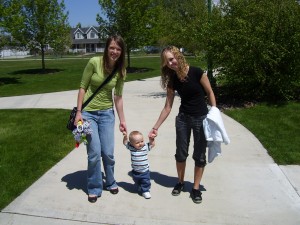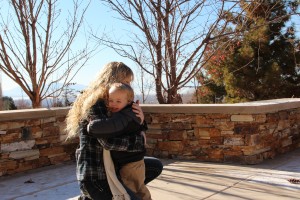Is Open Adoption Confusing For the Child?
I have said it countless times: adoption was the best choice for my son. However, in the same breath, I have whispered that I could not have done it if openness wasn’t an option. Open adoption, where both biological and adoptive families have some amount of personal information and there’s the option for contact, is argued to either have a positive or negative impact on the child. In my short experiences as a birth mother, I’ve been blessed to see the positive influence it has had on my son that I placed for adoption.
For example, just a few short months ago, my phone buzzed with the normal sound to tell me I had a text message. It was from my son’s mother, asking to Skype whenever I had time. We set up a meeting and I began to get the usual flutters of excitement as the time grew closer. As we chatted about the usual, my son’s attention began to drift and his mom reminded him of a question he had for me. His bright eyes looked straight through the screen at me and he asked, without blinking, “Why did you choose my mom and dad to be my mom and dad?” It was that exact moment I knew that open adoption was the best choice. It wasn’t only the best choice for me, but it was for him, too.

People have asked me, “Isn’t he confused?”, “Does he know that you’re his real mom?”, and “What does he call you?” My answers? “No, he’s not confused.”, “I’m his birth mother” (just stay away from any phrases beginning with the word “real” in adoption), and “He calls me by my name.” It’s his reality. It isn’t confusing for him. He’s not confused by what he has been raised to know. He doesn’t ask why he doesn’t live with me—but if he wants to know sometime, I’m willing to tell him why. Open adoption means that he can have unlimited answers to all those questions adoptees find themselves wondering: “Did she like strawberries as much as I do?”, “Does he have a cleft chin like me?” It’s an integral part of building your own foundation to life, knowing where your roots are from. For adopted children, they have roots that spread further than the norm, but how wonderful to know that itwas because they were so loved that their birth parents sacrificed so much for their well-being?

I was afraid that as my son grew older, he would grow bitter. Especially if he knew who I was but refused tobelieve why I chose adoption. However, in further research I have found a few universal truths.
1) Openness makes adoption easier to understand. “In closed adoption, the words ‘birthmother’ and ‘adoption’ are difficult for [young] children to understand because there is nothing concrete to attach to these words. In open adoption, the child has concrete information, and the birthmother is a concrete reality in his life. Therefore, it is much easier for children of open adoption to understand their adoption.” – Independent Adoption Center.

2) Openness provides access to important information. For example, my child has access to his familial medical history and other pertinent information about his biological predecessors. He knows who he “takes after” and he is familiar with people who may share some of his traits.
3) Openness helps adopted children know that they’re loved. My son knows how much I did, do, and will love him. While in closed adoptions the parents can reiterate that birth parents place children out of love, in open adoptions the child can see the love in ongoing and direct interactions.
Open adoption eliminates a lot of worries. I’m grateful for my sons’s parents’ willingness to be so upfront about my role in his life. Because of them, he has a great foundation for the knowledge of why adoption was the best option for the both of us. As he grows older, he will always have my available to answer his questions. And my hope is that my answers will help him fully understand that it wasall because I knew he deserved better than what I could give at the time, and that his adoption placement was all about love.





